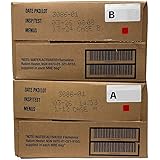Understanding the Types of Fuel
Common Fuel Types
When it comes to emergency fuel supplies, I’ve learned that not all fuels are created equal. There are common types like gasoline, diesel, and propane, each with its specific storage requirements. For example, gasoline is highly flammable and can vaporize quickly, while diesel is a bit less volatile but still requires careful handling.
It’s crucial to familiarize yourself with these different fuel types. When I started prepping, I researched each one to understand how they burn, how they can be safely stored, and what kind of containers are needed. Believe me, being informed is half the battle when it comes to safety.
Also, understanding the fuel you choose allows you to make more informed decisions. For instance, if you live in an area where extreme cold is common, propane can freeze, and so you’ll need to take additional steps to ensure safe storage during those colder months.
Choosing the Right Storage Containers
Quality Matters
One of the first things I learned was that not all containers are built for fuel storage. Investing in high-quality containers specifically designed for whatever fuel you’re storing is essential. Trust me; you don’t want to discover leaks or cracks when you’re relying on that fuel in an emergency.
When selecting containers, look for ones that meet your region’s safety standards. This means checking for approvals from safety organizations, which guarantees that they can handle the type of fuel you’re dealing with without issue.
Also, remember to consider the size of the container based on your storage space. I’ve seen people overestimate how much fuel they can safely store. Instead, measure your space and plan accordingly. A compact, correctly sized container is better than a big one that you can’t effectively manage.
Location is Key
Finding a Safe Spot
The location of your fuel storage is critical for safety purposes. When I first started, I thought the garage was a perfect spot until I learned about ventilation and temperature fluctuations. Ideally, look for a cool, dry place away from direct sunlight where the risk of fire is minimized.
A shed or a part of your basement that doesn’t see much traffic can be excellent options. Make sure it’s far from living spaces and any heat sources like a furnace or water heater, as these can pose significant risks when flammable fuels are involved.
== > What if ... Get a FREE Subscription to PREPARE
Also, ensure that your chosen spot is secure. I always recommend locks or securing heavy items around the storage area to prevent accidental access, especially if you’ve got kids or pets around.
Regular Maintenance and Checks
Stay Proactive
It’s super important to regularly check your fuel supplies. I can’t stress this enough from personal experience. Over time, containers can degrade, and seals might wear out. Setting a reminder to inspect your supplies every few months will save you from nasty surprises.
Get Preparedness and Self-Reliance Tips. Subscribe Now!
During these checks, look for any signs of corrosion or leaks and make sure the fuel hasn’t degraded. For example, gasoline can often go stale if not used within a few months. So rotating your fuel supplies ensures you always have a reliable source when you need it.
Additionally, keep an eye on the expiration dates, especially for additives. Some fuels have stabilizers that can only last for a certain period, so knowing when to refresh your supplies will keep things safe and efficient.
Emergency Preparedness Tips
Be Ready for Anything
Having your fuel stored properly is a step in the right direction, but I’ve learned that preparing for emergencies can go beyond that. Always have a plan in place for how to use that fuel effectively when the time comes. This could involve having appropriate tools on hand or knowing how to operate any gear with the fuel you’ve chosen.
Furthermore, consider keeping an emergency kit nearby, with items like flashlights, matches, and even fire extinguishers. Trust me, having these things readily accessible will help ease your mind, especially when tensions are high during an emergency.
Lastly, familiarize yourself with local regulations concerning fuel storage. This isn’t just valuable knowledge; it can prevent some hefty fines or even legal trouble down the line. Checking in with your fire department or local government can provide you with the information you need to store your fuel safely.
Frequently Asked Questions
1. What is the best fuel type for emergency storage?
It really depends on your needs! Gasoline is great for vehicles and small engines, but diesel is more stable and tends to last longer. Propane is a great option if you’re looking for versatility with grilling or heating. Assess your priorities before choosing!
2. Can I store fuel in my garage?
Yes, but with precautions! Make sure it’s well-ventilated, far from heat sources, and secure. Proper containment and safety measures are key if you choose to go this route.
3. How often should I check my fuel supplies?
I recommend checking every few months. This will help you catch any leaks or degradation early and allow you to keep your supplies fresh and usable.
4. Are there any special containers needed for fuel storage?
Absolutely! Always use containers specifically designed for the type of fuel you’re storing. They should meet safety standards to prevent leaks and spills.
5. What should I do if I find a leak in my fuel storage?
If you find a leak, it’s important to act quickly. Isolate the area, eliminate any sources of ignition, and contain the spill. Then, follow local guidelines for disposing of fuel safely and consult a professional if necessary.






